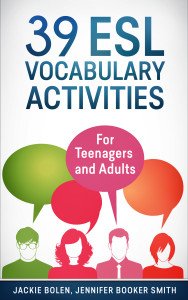If you’re looking for some vocabulary activities ESL, then you’re certainly in the right place! Keep on reading for more than 20 ideas for ESL vocabulary games and activities, along with worksheets, lesson plans and more.

TEFL vocabulary activities and games
Fun ESL Vocabulary Activities
Check out these ESL teaching vocabulary activities for children, teenagers, and adults. Not sure how to give instructions for these ESL activities? Check out some awesome tips for giving instructions to ESL students!
#1: Odd One Out
Try out this simple ESL vocabulary game that makes a great review. Write down 4 things, one of which doesn’t fit that well. For example:
- apple, orange, carrot, grapes
Students might say that carrot doesn’t fit because it’s a vegetable, not a fruit. Find out more about this simple game here:
#2: Steal the Eraser ESL Vocabulary Game
If you want to create some fun and excitement in your classes, then you’ll want to try out this ESL vocabulary game! Students compete to grab an eraser for a chance to answer a review question. It could certainly be related to a vocabulary set that you’ve just taught. Have a look here to level up the fun in your class!
#3: The Memory Circle Game
This is a simple vocabulary game for ESL that can review just about anything. Students have to remember what previous people have said and then add their own statements. Learn more about it here:
#4: Phrasal Verb Games and Activities
Phrasal verbs can be a little bit tricky! They consist of a verb and a preposition or particle of some kind. The meaning is usually unrelated to the words that make it up. For example, pick up or check out have various meanings.
The good news is that I have lots of fun ideas for teaching them. Have a look here:
#5: Vocabulary Board Games
I love to play board games in real life and that’s why I like to use them in my classes to review key vocabulary. They’re fun, engaging, student-centred and interactive and students love them! The good news is that it’s super easy to make your own. Find out how here:
#6: I’m an Alien ESL Vocab Activity
Unless students are total beginners, it’s often the case that they already know a good bit of vocabulary about many topics (hobbies, sports, food, etc.) before you teach them. If this is the case, try out this simple warm-up activity. It can help students to activate their prior knowledge, which will make any new stuff way more memorable.
#7: TEFL Holiday Lessons
I love to include some lessons on the holidays in my classes. It’s a nice break from the textbook for sure and students really enjoy them. Here are some ideas for the most popular holidays:
#8: Guess the Word
Try out this simple vocab review game for English learners. Students have to give clues to one of their classmates who has to guess what the word is. Learn more about it here:
#9: Preposition Activities
I love to teach prepositions to my students. There are so many fun activities to do related to that. Have a look here for some of my favourite ideas:
#10: Vocabulary Guessing Games
I love to include a bit of fun in my classes and one way that I do that is with some guessing games. Here’s a difficult animal one, but have a look around on YouTube. You can find them for any topic and level:
#11: The Talk Show
A nice way to get students talking about a certain topic and using a set of vocabulary is to do a talk show. It turns something kind of boring (talk with your partner) into something new and slightly more exciting. Have a look here for all the details:
#12: Me Too!
Try out this simple speaking and listening activity to review a variety of things (months of the year, seasons, hobbies, past tense, food, etc.)
Students have to make a true statement about themselves. For example:
- I love pizza.
- My family goes for a walk every night.
- My least favourite season is winter.
If the other students agree, they can stand up and say, “Me too!
#13: Dictation ESL Vocabulary Activity
Okay, I know that dictation is a little bit old-school but it does certainly have some value. It can help students to focus on spelling, homophones, punctuation and sentence structure. Have a look here for how I use is to teach English vocabulary and grammar:
#14: Comparatives and Superlatives
These kinds of adjectives are very common in the English language (comparative: My brother is taller than me. Superlative: Russia is the biggest country). There are lots of fun ideas for teach them here:
ESL Comparative/Superlative Activities.
#15: Charades
Charades is one of my favourite ESL vocabulary games. Students have to act out a word, phrase, or sentence (depending on the level) and the other students in the class have to guess what it is. Have some fun with this simple game!
#16: Pictionary ESL Vocabulary Game
This activity is very similar to charades, except in Pictionary, students have to draw the word or statement instead of act it out. Their classmates have to guess what it is.
#17: Flyswatter
Okay, if you need just one super-fun and exciting ESL vocabulary game, this one might be it! Almost nothing else can create as much excitement in the classroom as this one. Check out the video to find out all the details:
#18: Part of the Body ESL Activities
Body parts are one of those things that even some higher-level learners don’t know that well. They may struggle with things like eyebrows, elbows, big toe, etc. Have a look here for some fun ideas for teaching:
#19: Consider Using the Bilingual Method of Teaching English
Some vocabulary items can be quite difficult to explain, in English. An easy way around that if you share another common language is to quickly use that to explain the item. Then, get back to English. It can save a lot of time for practice opportunities. Learn more about the pros and cons here:
The Bilingual Method of Teaching English Pros and Cons.
#20: Teaching Homophones
Homophones are words that sound the same or very similar but have different spellings and meanings (too, to, two). I may be a bit of a grammar nerd but I love to point them out to my students. Here are some of the most common ones for English learners to be aware of:
#21: Ideas for Teaching Business English
Business English is certainly its own thing! The vocabulary you might use in the business world is quite specific and students have to put some effort into learning it. Have a look here for some of my favourite ideas:
#22: Spelling Games
A big part of vocabulary when it comes to writing is knowing how to spell words. Check out some of my favourite options for teaching this important skill here:
ESL Vocabulary Worksheets
If you’re looking for some of the best TEFL vocab worksheets, don’t reinvent the wheel. Have a look here for some of the best options:

Vocabulary games for ESL/EFL
ESL Vocab Lesson Plans
These out these fun TEFL vocabulary lesson plans for some great ideas for teaching new words.
FAQs
There are a number of common questions that people have about teaching vocab to English learners. Here are the answers to some of the most popular ones.
How do you teach vocabulary to ELL students?
To teach vocabulary to ELL students, there are a number of strategies to use.
- Use realia in the classroom whenever possible.
- Don’t forget to set the context in any lesson.
- Extensive reading and listening are helpful in vocab acquisition.
- Use a variety of vocabulary games and activities.
- Teach cognates.
- Scaffold new words with the old ones students already know.
- Modal correct usage of new vocabulary.
- Get students to use the new language.
How do I teach advanced vocabulary to ESL?
To teach advanced vocabulary to ESL/EFL students, here are a few things you can do:
- Use authentic materials (those not designed for English learners).
- Encourage extensive reading outside of the classroom.
- Focus on phrasal verbs, collocations, idioms, etc.
- Have students prepare for an IELTS or TOEFL exam.
- Use debate.
- Encourage students to speak to each other only in English.
What is the most widely used method for teaching vocabulary in ESL?
The most widely used method for teaching vocabulary in ESL is the communicative approach. This encourages students to use whatever language they’d like to communicate with one another. The key thing is that their meaning in understood.
More Ideas for Teaching ESL Vocabulary
Years ago, I was assigned “Vocabulary” at a winter camp for university students. My first thought was, “Oh no…this is going to be so boring!” Then, I got to work coming up with a variety of fun and interesting activities and games to help my students remember new English words.
The result is this book of fun, engaging vocabulary activities. I like to mix things up in the classroom and keep things fresh for my students. Not only are they happier, but I think they learn better too because their brains have to adapt to new things.
Keep on reading to find out more about how to help your students learn new English words. It’s easier than you might think, so don’t worry. Help is here.
Why Get the Book?
Whether you’re a first-time English teacher, an experienced but overwhelmed instructor, or someone without a textbook thrown into the sea without a life jacket, you need more activities for your classes. If you’re tired of wading through the junk on the Internet to find the ESL vocabulary activities that aren’t terrible and that you can actually use in your classes, then Jackie and Jennifer are here to help.
During their 20 years teaching English, they’ve developed countless games and activities for their students. Now, they’re sharing their favourite ideas for English vocabulary games and activities with ESL teachers throughout the world.
In 39 ESL Vocabulary Activities for Teenagers and Adults, you’ll get over three-dozen ideas to use in your own classroom. The highly-detailed descriptions will show you exactly how to use the activities during your lessons. These clearly and concisely explained activities will help you add instructional variety and put the focus back on your students.
Best of All…
Best of all, the words that you’re trying to teach your students will become more memorable and meaningful. If your goal is to help students with vocabulary acquisition for the long term, you’ve found your book! Consider using this along with something like a podcast for a complete ESL vocabulary picture.
If you’re extremely busy or you’re simply out of new ideas, Jackie and Jennifer’s book makes it easy to try out new and exciting activities which focus on learning vocabulary and that your students will love! It’s lesson planning made easy, guaranteed.
Where Can I Get 39 Vocabulary Activities?
You can get 39 ESL Vocabulary Activities: For Teenagers and Adults on Amazon in both print and digital formats. The electronic version can be read on any Mac, PC, tablet or Smartphone with the Kindle App.
Keep a copy on the bookshelf in your office as a handy reference tool to take out when you’re thinking of what to do in class. Or, take the digital version with you on your phone to your favourite coffee shop for lesson planning on the go. It really is that easy.
Click the link below to buy the book on Amazon, but only if you want to save some time and have awesome classes focused on learning new vocabulary quickly and easily. Learn more here:
—>39 ESL Vocabulary Activities on Amazon<—
English Vocabulary Activities: Join the Conversation
Do you have any go-to activities or games to help your students remember new words? Leave a comment below and let us know what you think. We’d love to hear from you.




